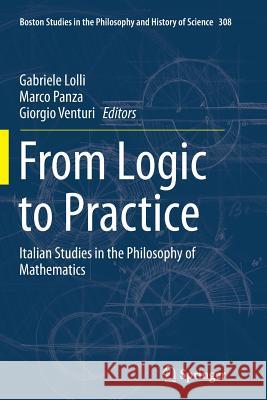From Logic to Practice: Italian Studies in the Philosophy of Mathematics » książka



From Logic to Practice: Italian Studies in the Philosophy of Mathematics
ISBN-13: 9783319348452 / Angielski / Miękka / 2016 / 336 str.
From Logic to Practice: Italian Studies in the Philosophy of Mathematics
ISBN-13: 9783319348452 / Angielski / Miękka / 2016 / 336 str.
(netto: 191,66 VAT: 5%)
Najniższa cena z 30 dni: 192,74
ok. 16-18 dni roboczych.
Darmowa dostawa!
This book brings together young researchers from a variety of fields within mathematics, philosophy and logic.
PART I: THE HISTORICAL DIMENSION OF MATHEMATICS.- Chapter 1: A Geometrical Constructive Approach to Infinitesimal Analysis: Epistemological Potential and Boundaries of Tractional Motion; Pietro Milici.- Chapter 2: Plane and Solid Geometry: A Note on Purity of Methods; Paolo Mancosu and Andrew Arana.- Chapter 3: Formalization and Intuition in Husserl's Raumbuch; Edoardo Caracciolo.- PART II: LOOKING AT MATHEMATICS THROUGH LOGIC.- Chapter 4: Frege's Grundgesetze and a Reassessment of Predicativity; Francesca Boccuni.- Chapter 5: A Deflationary Account of the Truth of the Gödel Sentence G; Mario Piazza and Gabriele Pulcini.- Chapter 6: Rule-following and the Limits of Formalization: Wittgenstein's Considerations Through the Lens of Logic; Paolo Pistone.- Chapter 7: Paradox and Inconsistency: Revising Tennant's Distinction Through Schroeder-Heister's Assumption Rules; Luca Tranchini.- Chapter 8: Costructability and Geometry; Alberto Naibo.- Chapter 9: A Cut-like Inference in a Framework of Explicit Composition for Various Calculi of Natural Deduction; Michael Arndt and Laura Tesconi.- Chapter 10: On the Distinction Between Sets and Classes: A Categorical Perspective; Samuele Maschio.- PART III: PHILOSOPHY AND MATHEMATICS.- Chapter 11: Structure and Applicability; Michele Ginammi.- Chapter 12: Defending Maddy's Mathematical Naturalism from Roland's Criticism: The Role of Mathematical Depth; Marina Imocrante.- Chapter 13: On the Indispensable Premises of the Indispensability Argument; Marco Panza and Andrea Sereni.- Chapter 14: Naturalness in Mathematics: On the Statical-dynamical Opposition; Luca San Mauro and Giorgio Venturi.- Chapter 15: An Inquiry Into the Practice of Proving in Low-dimensional Topology; Silvia de Toffoli and Valeria Giardino.
Gabriele Lolli is Professor of Philosophy of Mathematics at the Scuola Normale Superiore of Pisa, after a career in Mathematical Logic. His main present interests concern the origin of set theory, mathematical proof and the relations between mathematics and literature. Among his recent publications are QED. Fenomenologia della dimostrazione, Bollati Boringhieri, Turin, 2005; “Experimental methods in proofs", in R. Lupacchini, G. Corsi (eds.), Deduction, Computation, Experiment, Springer, 2008; Nascita di un'idea matematica, Edizioni della Normale, Pisa, 2013; “Mathematics according to Calvino", in M. Emmer (ed.), Imagine Math2, Springer, 2013.
Marco Panza is Research Director at the CNRS and member of the IHPST (CNRS and Univ. of Paris 1 Panthéon Sorbonne). He is the author of several books and papers and the editor of several collective volumes in the domains of history and philosophy of mathematics. For the Boston Studies in the Philosophy of Sciences, he edited, with M. Otte, Analysis and sinthesis in Mathematics. History and Philosophy (1997). His books include: Newton et les origines de l'analyse, 1664-1666, Blanchard, Paris, 2005, and Plato's Problem. Introduction to Mathematical Platoinism, Palgrave Mac Millan, Bsingstoke (UK), 2013 (co-authored with Andrea Sereni).
Giorgio Venturi is currently a post-doc at CLE (Campinas) and former PhD student both in philosophy at Scuola Normale Superiore of Pisa, under the supervision of Gabriele Lolli, and in mathematics at the Université Paris Diderot, under the supervision of Boban Velickovic. His main research field is set theory, both from a purely mathematical perspective - he co-authored Velickovic Proper forcing remastered appeared in Appalachian set theory (Cambridge University Press) - and from a philosophical point of view, as in Foundation of mathematics between theory and practice appeared in Philosophia scientae 18(1), 2014.
This book brings together young researchers from a variety of fields within mathematics, philosophy and logic. It discusses questions that arise in their work, as well as themes and reactions that appear to be similar in different contexts. The book shows that a fairly intensive activity in the philosophy of mathematics is underway, due on the one hand to the disillusionment with respect to traditional answers, on the other to exciting new features of present day mathematics. The book explains how the problem of applicability once again plays a central role in the development of mathematics. It examines how new languages different from the logical ones (mostly figural), are recognized as valid and experimented with and how unifying concepts (structure, category, set) are in competition for those who look at this form of unification. It further shows that traditional philosophies, such as constructivism, while still lively, are no longer only philosophies, but guidelines for research. Finally, the book demonstrates that the search for and validation of new axioms is analyzed with a blend of mathematical historical, philosophical, psychological considerations.
1997-2026 DolnySlask.com Agencja Internetowa
KrainaKsiazek.PL - Księgarnia Internetowa









